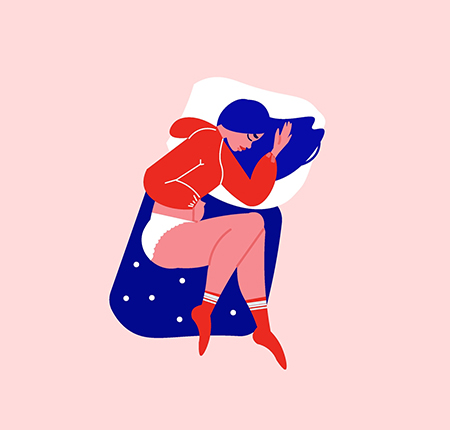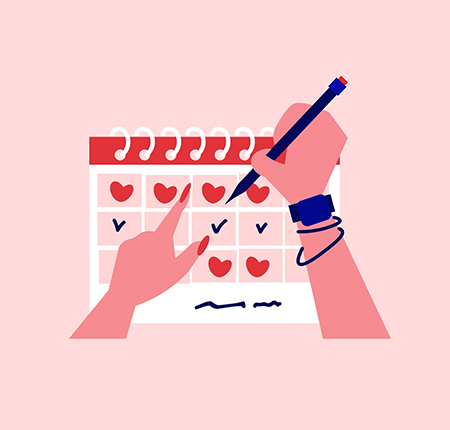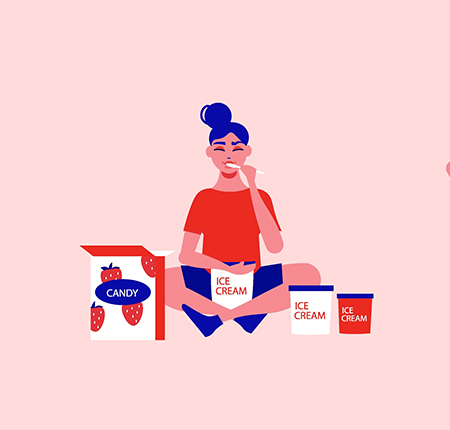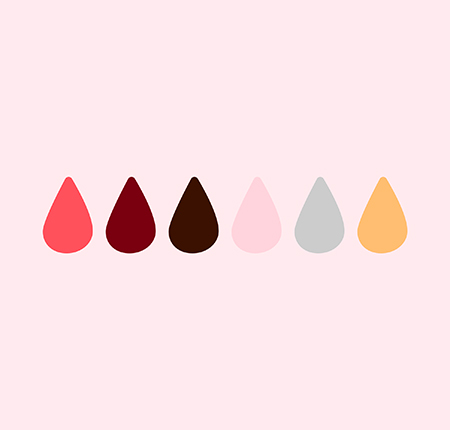
Menstruation - EVERYTHING you need to know
Did you know that the menstrual cycle is more than just menstruation? In fact, menstruation is only the first phase of your menstrual cycle. So it's worth paying a little attention: what does this mean, concretely, and how does it affect your health and everyday life?
What does menstruation mean?
Menstruation is the vaginal bleeding that occurs monthly, during which blood and tissue from inside the uterus is eliminated through the cervix and vagina. Menstruation usually:
it appears once every 21 - 35 days, the average being 28 days
lasts between 2 - 7 days
means 40 - 80 ml of blood removed
The first menstruation is menarche, it occurs around 11-13 years, and the end of menstruation is menopause, and it occurs between 45-55 years.
Menstruation symptoms
Each month, your period sheds the lining of the uterus prepared by your body to support a possible pregnancy. If an egg is not fertilized and pregnancy does not occur, the uterus will shed the prepared tissue. What can you feel during your period?

Common symptoms are:
Abdominal, pelvic cramps
Back pain
Breast tenderness
Mood swings
Changes in appetite
DISORDERS
Fatigue
One of the most common symptoms during menstruation is abdominal cramps. Cramps are a reality. In fact, menstrual pain, known in medical terms as dysmenorrhea, is specific to menstruation. They occur before or during them and can vary in intensity. It is estimated that between 50% - 80% of women have experienced dysmenorrhea at some point in their lives. It is also the most common reason for gynecological consultations and one of the most important reasons for absenteeism (at school or at work).
Premenstrual symptoms/PMS (before menstruation)
Premenstrual syndrome (or PMS) is a group of physical and emotional symptoms that begin before menstruation and that you may recognize:
Anxiety
Depressed state
Changes of disposition
Irritability
Cravings for certain foods
Insomnia
Difficulty concentrating
Muscle or joint pain
Headaches
Increased fatigue
bloating
Breast tenderness
Acne
Constipation or diarrhea
Menstrual cycle
And speaking of hormones, your body operates on hormonal signals throughout your menstrual cycle, which can be divided into four phases: menstruation, follicular phase, ovulation, and luteal phase.
The menstrual cycle is a term used to describe the sequence of events that occur in a woman's body as it prepares for the possibility of pregnancy each month. A menstrual cycle is considered to begin on the first day of menstruation. The average cycle is 28 days long, however, the length of a cycle can vary from 21 days to around 35 days.
Although PMS has no direct cause, there are several factors that can contribute to its occurrence: hormonal changes, serotonin fluctuations, low iron or vitamin levels.
Menstrual phase
This phase usually lasts between the first and fifth days of the cycle and is when the lining of the uterus is shed through the vagina, if pregnancy has not occurred. Most people bleed for three to five days, but a period that lasts as little as two days or as long as seven days is considered normal.
Follicular phase (pre-ovulatory)
In the follicular phase, under the influence of follicle-stimulating hormone (FSH) in an ovary, a follicle (ie a small cavity in the ovary) will be chosen for ovulation. Estrogen will appear in the circulation, and the endometrium will begin to thicken. The follicular phase usually lasts around 8 days: from day 6 to day 14 of your cycle.

Ovulation (ovulatory phase)
The ovulatory phase begins with a massive release of luteinizing hormone (LH), and the egg is now ready to be released. If fertilization does not occur within 24 hours, the unfertilized egg will disintegrate.
Luteal phase (postovulatory)
After ovulation, you go through the luteal phase. This lasts on average 14 days (if you are not pregnant) and ends on day 1 of the next period: the progesterone level drops and the cycle starts again.
Normal menstruation
Although it may seem like a large amount (especially on your heavy days), the amount of blood removed from the body during menstruation does not exceed 60-80 ml. And a normal menstrual flow lasts between 3 and 7 days. During this time, you may experience normal menstrual symptoms, including acne, bloating, mood swings and cramps, or insomnia .

Irregular menstrual cycle - Causes
After you get past your first period, changes in the length or intensity of your cycle and period are completely normal, even after several years. These changes also depend on other factors, such as:
Stress
Diet
Some medicines
Excessive physical exertion
Polycystic Ovary Syndrome
Diseases of the thyroid gland
Other conditions (endometrial polyps, uterine fibroids)
There are also irregular cycles, when you don't ovulate every month. But if the changes are major or too many, it is best to consult a doctor.
Characteristics of irregular menstruation
Irregular periods can happen to anyone and the factors that cause these irregularities vary but are mainly related to the balance of your hormones.
An irregular period can also be a sign of more serious conditions:
Hypothyroidism
Hyperthyroidism
Decreased ovarian capacity (may occur in people under 40)
Uterine polyps
Polycystic ovary syndrome
It is important to know that you can recognize an irregular cycle when:
The time between two periods changes often and significantly
You eliminate a much smaller or larger amount than usual
The duration of the menstrual cycle varies greatly from one month to the next
Changes in hormonal balance can disrupt the menstrual cycle. This is why irregular periods are more common at puberty and near menopause. Other common causes, in addition to those listed above, can be:
Changing birth control pills
Intensive practice of a sport or exercise
Pregnancy and breast-feeding
Uterine fibroids
Prevention of menstrual irregularities
There are quite a few things that could help you improve your menstrual symptoms and prevent irregular periods and, of course, get rid of painful cramps. They can be practiced every day of the menstrual cycle as part of the lifestyle.
Here are some healthy habits for a balanced period:
Healthy diet. To reduce the risks of inflammation in the body, the right dietary supplements also help.

Hydration . Drinking enough fluids is important and can reduce period bloating and muscle pain.
Herbal teas . Herbs and plants are known to have therapeutic properties, so is it worth trying a mint, chamomile, ginger or fennel tea?
Organic absorbents & tampons . Menstrual products must be 100% organic. The non-organic ones contain plastic and chemicals that seriously damage the hormonal balance. Did you know that all the toxins in conventional products can make cramps worse?
Aromatherapy, or massages with essential oils - these can help you relax very easily. Choose lavender, clove, rose, sage oil, or, why not, make your own oil mix!
CBD oil . Several studies have demonstrated the anti-inflammatory, analgesic and mood-enhancing effects of using CBD oil, particularly in menstrual disorders.
Physical exercises . The endorphins from exercise can improve your overall mood and relieve pain and cramps. It helps to take regular walks, yoga, or stretching.
Sexual health. It's no surprise that vibrators stimulate blood circulation and oxygenate the muscles. In addition, sex toys cause waves of pleasure so they can also get rid of cramps. So you only have to win :P
Observance of sleep. Sleep is essential, especially during menstruation. Lack of sleep can increase your stress levels in general, but when you get enough, it helps relax your muscles and take care of your hormones.
Visit to the gynecologist
If you notice major changes in your cycle, it is recommended to go to the gynecologist: they may be signs of medical problems that should be treated. Here are possible reasons for concern and consultation is absolutely recommended:
You have not started menstruating and you are over 15 years old
Your period has suddenly stopped for more than 90 days but you are not pregnant
Your period has suddenly become irregular
Your menstrual cycle lasts less than 21 days or more than 36 days
Bleeding lasts more than 7 days
Your flow is much heavier than usual
You have severe pain during your period
You have a fever and feel very sick after using tampons
Menstrual calendar - Cycle monitoring
The good part is that you can manage your menstrual cycle best and discover any problems early when you monitor it regularly! Monitoring in the form of a calendar, a diary or through a phone application has many benefits: you discover an irregular cycle in time, you can avoid pregnancy during the non-fertile period (but don't forget contraceptives!), you can plan your vacation days , you can understand when and why you feel more energetic or prone to mood swings.
We recommend you to use an app (for example Flo) - there are many popular apps for menstruation , tested by thousands of people and recommended. Or you can create your own diary or calendar with information such as vaginal discharge and how it changes, sex drive level, menstrual cramps and so on.
What color can the blood have during menstruation
The color of menstrual blood can vary, and that's okay. So, you can notice different shades of blood during menstruation and there are reasons why these colors change! Some can be cause for concern, so it's good to keep in mind if you have other unpleasant symptoms.

- Pink menstruation
The pink color can appear when you have spotting or light bleeding between periods. It can occur right in the middle of the cycle and can be a discharge of cervical fluids with blood, due to ovulation. - Brown menstruation
At the beginning or end of menstruation, the blood may have a brown or dark red hue and may have a thicker consistency. The reason? The blood is older and took longer to leave the uterus. - Black menstruation
Likewise, older blood may be darker in color (toward black) and may appear at the beginning or end of the period. However, if it is grey, it could be a sign of infection. Consult a gynecologist. - Red menstruation
The bright red color appears on your period when you have a heavy flow, usually on the second or third day of your period, because the lining of the uterus is shed very quickly and the blood is new.
Disorders of the menstrual cycle
Menstruation is a natural process. However, if one or more symptoms you have before or during your period are causing you difficulties and problems, it may be a cycle disorder. What are menstrual cycle disorders and conditions? Here are some of them:
Abnormal bleeding, which may include heavy menstrual bleeding
Lack of bleeding (or amenorrhea)
Bleeding between periods
Intense pain during menstruation - which is not normal - or dysmenorrhea
Premenstrual dysphoric disorder – a severe form of premenstrual syndrome
Hygiene products useful during menstruation
When it comes to the products you use during your period, you need to know what works best for you, and for that, it's good to know your flow, your symptoms, your desired level of comfort and the physical activities you will have during menstrual period.
In recent years, the market for menstrual products has become increasingly diverse, although not all products are created with the same care for the body and nature. Some use ingredients that are toxic to the body, and brands are not required to list everything a product contains on the package.

But let's see what sustainable options exist today:
Organic tampons
ENROUSH pads are easy to use, made to absorb flow evenly across the entire surface and contain only 100% organic cotton, no other ingredients.
Organic absorbents
Individually wrapped, easy to store and transport, ENROUSH absorbent pads are made from 100% GOTS certified organic cotton and only natural, plant-based fibers. They do not contain perfume and bleaches, thus minimizing the risk of irritation or allergies.
Reusable absorbents
Comfortable and easy to clean, mainly made of cotton, but not yet regulated and may contain synthetic materials.
Menstrual cup
It can be worn for up to 12 hours and is made from medical-grade silicone with no chemicals, plastic or dyes. It suits a medium to heavy flow but it can take a while to get used to wearing it. The menstrual cup has a lifespan of up to 10 years.
Reusable menstrual disc
It can be worn for up to 12 hours, you can have sex while wearing it. It's made from ultra-thin medical grade silicone, but differs from the cup in that it doesn't have a gripper, so it can take some getting used to and be harder to insert/remove.
Frequently asked questions about menstruation
Your cycle is unique. And it's very important to know more about what it means, or how it can affect you in your everyday life. Of course, one can live without menstruation: for some women it is more beneficial for it to be suppressed; for example, in the case of endometriosis.

In any case, menstruation can also mean luck from another perspective: it's a good excuse to take more care of your well-being and take care of yourself! There are also a lot of myths and misinformation surrounding menstruation. Here are some extremely common questions!
How long before menstruation do your breasts hurt?
Breast tenderness is one of the symptoms of premenstrual syndrome and usually appears a few days before menstruation. But it's not a rule! Some people have breast pain 4-5 days before, others say they have increased breast tenderness 1-2 weeks before. Every body is unique.
How long does a period last during pregnancy?
Some people may experience bleeding or spotting during pregnancy, and this is common in the first trimester. 30% of women may have bleeding during this period and it may last 1-2 days. It should be noted that any heavy bleeding during pregnancy requires emergency medical attention.
How many days after menstruation are you protected?
The risk of getting pregnant with unprotected sexual contact is never 0, regardless of the day of your menstrual cycle! However, the first 10 days after menstruation can be infertile.
How long does the first period last after birth?
The first bleeding after birth can last up to 12 weeks. These are not the same as menstruation but are "leftovers" from the tissue of the uterus.
What to do when your stomach hurts from menstruation?
Dysmenorrhea or abdominal pain and cramps during menstruation can be relieved by various methods: you can heat the area with a hot water bottle, warm baths, or anti-inflammatory drugs. Light exercise helps and orgasms help relax muscles and relieve cramps.
How much blood is lost during menstruation?
Even if it sometimes seems more - due to blood clots - it is normal to lose around 60 - 80 ml of blood each month. If the amount exceeds 80 ml (you change menstrual products several times an hour, several days in a row), consult a doctor.
What happens if you donate blood during your period?
You can donate blood during your period, nothing will happen. But still, it is recommended to consult a doctor first, because it may be better to wait until the bleeding stops.
Are you allowed to take a bath when you are on your period?
Yes. There are no contraindications.
What vitamins do you lose during menstruation?
Every body is different, but you can lose vitamins and minerals during menstruation, for example: vitamin C, E, B, or magnesium.
Can you have sex when you are on your period?
Yes, but don't forget to protect yourself!






















